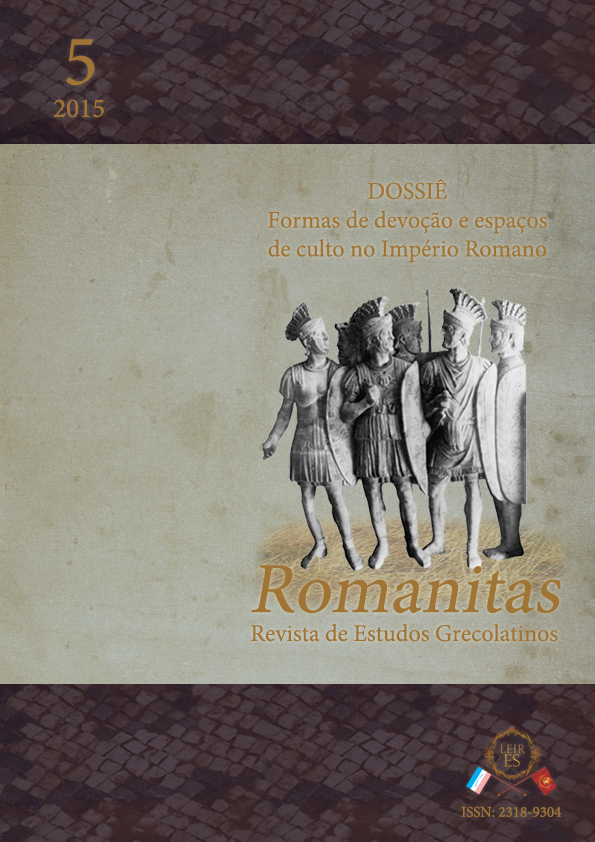The religious element in the interpretation of the events of ‘Persian War’
DOI:
https://doi.org/10.17648/rom.v0i5.11217Keywords:
Byzantine Empire, Procopius of Caesarea, Tykhe, GodAbstract
Procopius of Caesarea, a Byzantine historian, in the sixth century AD, provided very different pictures of the Justinian´s ruler. The author, in his Works, also provided a heterogeneous set of religious information that still leads many historians to discuss the meaning of his beliefs and importance of Divine Providence in the interpretation of events. The purpose of this article is to emphasize the religious element in the Persian War, discussing the use of Christian references, in a fatalistic way, in order to criticizing the Emperor Justinian. Also we will discuss the role of God and Tykhe in the explanation of events.
Downloads
References
Documentação textual
AFTÔNIO. Progymnasmata. Traduit par Michel Patillon. Paris: Les Belles Lettre, 2008.
AGATIAS. The histories. Trad. Joseph D. Frendo. Alemanha: de Gruyter, 1975.
HOMERO. Iliade. Traduit par Eugène Bareste. Paris: Libraire-éditeur, 1843.
JUSTINIANO. Corpus Juris Civilis. Tradução de S. P. Scott. Cincinnati: Central Trust Company, 1932.
PROCÓPIO. History of the war. English translation by H. B. Dewing. Cambridge: Harvard University Press, 2006.
______. Buildings. English translation by H. B. Dewing. Cambridge: Harvard University Press, 1996.
______. Secret History. English translation by H. B. Dewing. Cambridge: Harvard University Press, 1935.
TUCÍDIDES. History of the Peloponnesian War. Translated by Charles Forster Smith. Cambridge: Harvard University Press, 1962.
Obras de apoio
BAPTISTA, L. V. O Logos da Guerra Pérsica: uma análise da perspectiva histórica da obra de Procópio de Cesareia (VI d.C.). 2013. Tese (Doutorado em História) – Programa de Pós-Graduação em História da Universidade Federal do Rio Grande do Sul, Porto Alegre, 2013.
BITTON-ASHKELONY, B.; KOFSKY, A. The monastic school of Gaza. Leiden: Brill, 2006.
BLICKMAN, D. R. The role of the plague in the “Iliad”. Classical Antiquity, v. 6, n. 1, p. 1-10, 1987.
BRIDGES, E.; HALL, E.; RHODES, P. J. Cultural responses to the Persian Wars: Antiquity to the Third Millennium. Oxford: University Press, 2007.
CAMERON, A. New Themes and styles in Greek literature, a title revisited. In.: JOHNSON, S. F. (Ed.). Greek literature in late antiquity: dynamism, didacticism, classicism. Hampshire: Ashgate, 2006 p. 11-28.
______. Procopius and the sixth century. London: Routledge, 1996.
______. Christianity and tradition in the historiography of the Late Empire. The Classical Quarterly, v. 14, n. 2, p. 316-328, 1964.
DIGNAS, B.; WINTER, E. Rome and Persian in Late Antiquity: neighbours and rivals. Cambridge: University Press, 2007.
DOWNEY, G. Paganism and Christianity in Procopius. Church History, v. 18, n. 2, p. 89-102, 1949.
EVANS , J. A. S. The age of Justinian. London: Routledge, 1996.
______. Procopius. New York: Twayne Publishers, 1972.
______. Procopius of Caesarea and the Emperor Justinian. Historical Papers/Communications historiques, vol. 3, n. 1, p. 126-139, 1968.
FRAKES, J. C. The fate of fortune in the Early Middle Ages: the Boethian tradition. Leiden: E. J. Brill, 1988.
GIBBON, E. The history of the decline and fall of the Roman Empire. Boston: Phillips, Sampson, and Company, 1985.
GONZÁLEZ FERNÁNDEZ, R. Las estructuras ideológicas del Código de Justiniano. Murcia: Universidad de Murcia, 1997.
GREATREX, G. Procopius the outsider? In.: SMYTHE, D. C. (Ed.). Strangers to themselves: the Byzantine Outsider: Papers from the Thirty-Second Spring Symposium of Byzantine Studies, University of Sussex, Brighton, mar. 1998. Aldershot: Ashgate, 2000, p. 215-228.
GURAN, P. Eschatologie et théologie politique dans les derniers siècles de Byzance. Revue des études Sud-est européennes, 2007, v. 45, n. 1-4, p. 73-85.
HOWARD-JOHNSTON, J. The education and expertise of Procopius. Antiquité Tardive, 8, p. 19-30, 2000.
KALDELLIS, A. Procopius’ Persian War: a thematic and literary analysis. In.: MACRIDES, R. (Ed.). History as literature in Byzantium: papers from the Fortieth Springs Symposium of Byzantine Studies, University of Birmingham. Surrey: Ashgate, 2010, p. 253-273.
KALDELLIS, A. Procopius of Caesarea: tyranny, history, and philosophy at the end of Antiquity. Philadelphia: University of Pennsylvania Press, 2004.
KAZDHAN, A.; CONSTABLE, Giles. People and power in Byzantium: an introduction to modern studies. Washington: Dumbarton Oaks Center, 1996.
KOUROÚMALI, M. Procopius and the Gothic War. 2005. Thesis (Doctorate on Philosophy) - Corpus Christi College and History Faculty, University of Oxford, Oxford, 2005.
KRUMBACHER, K. The history of Byzantine Literature: from Justinian to the end of the Eastern Roman Empire (527-1453). Notre Dame: University of Notre Dame, 2001.
MAIER, F. G. Bizancio. México: Siglo Veintiuno, 1991.
MARÍN CONESA, R. Determinismo y contingencia en la obra historiográfica de Procópio Cesariense: la significación de Tykhē y Zeos. Lengua e historia, v. 9/10, p. 143-162, 1995.
PAZDERNIK, C. F. Justinianic ideology and the power of the past. In. MAAS, M. (Ed.). The Cambridge Companion to the Age of Justinian. Cambridge: Cambridge University Press, 2005, p. 185-214.
TREADGOLD, W. The early Byzantine historians. London: Palgrave Macmillan, 2010.
TROMBLEY, F. R. Christianity and paganism, II: Asia Minor. In.: CASIDAY, A.; NORRIS, F. W. (Eds.). The Cambridge history of Christianity: Constantine to c. 600. Cambrigde: Cambrigde University Press, 2007, p. 189-209.
Downloads
Published
How to Cite
Issue
Section
License
Copyright (c) 2015 Romanitas - Revista de Estudos Grecolatinos

This work is licensed under a Creative Commons Attribution-NonCommercial-NoDerivatives 4.0 International License.
a. The authors retain copyright and grant the journal the right to first publication.
b. The authors are authorized to assume additional contracts separately, for non-exclusive distribution of the version of the work published in this journal (e.g., publishing in institutional repository or as a book chapter), with acknowledgment of authorship and initial publication in this journal.
c. Authors are allowed and encouraged to publish and distribute their work online (e.g. in institutional repositories or on their personal page) after the first publication by the journal, with due credit.
d. The journal's texts are licensed under a CC BY 4.0 Deed Attribution 4.0 International Licence (CC BY).




























